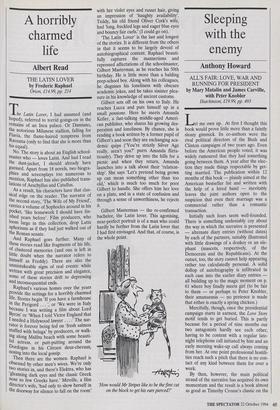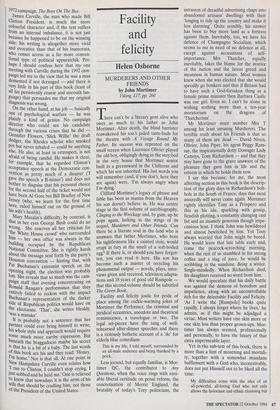Sleeping with the enemy
Anthony Howard
ALL'S FAIR: LOVE, WAR AND RUNNING FOR PRESIDENT by Mary Matalin and James Carville, with Peter Knobler Hutchinson, £19.99, pp. 493 Let me own up. At first I thought this book would prove little more than a faintly sleazy gimmick. Its co-authors were the rival political directors of the Bush and Clinton campaigns of two years ago. Even before the American people voted, it was widely rumoured that they had something going between them. A year after the elec- tion they made things respectable by get- ting married. The publication within 12 months of this book — plainly aimed at the American bestseller list and written with the help of a hired hand — inevitably leaves the joint authors open to the suspicion that even their marriage was a commercial rather than a romantic transaction.
Initially such fears seem well-founded. There is something undeniably coy about the way in which the narrative is presented — alternate diary entries (without dates) by each of the partners, suitably illustrated with little drawings of a donkey or an ele- phant (mascots, respectively, of the Democrats and the Republicans). At the outset, too, the story cannot help appearing rather too calculatedly personal. A solid dollop of autobiography is infiltrated in each case into the earlier diary entries all building up to the magic moment on p. 61 where boy finally meets girl (to be fair to them — or perhaps to Peter Knobler, their amanuensis — no pretence is made that either is exactly a spring chicken.) Mercifully, though, once the presidential campaign starts in earnest, the Love Story motif tends to get buried. This is partly because for a period of nine months our two antagonists hardly see each other, having to be content with a regular late- night telephone call initiated by him and an early morning wake-up call always coming from her. At one point professional hostili- ties reach such a pitch that there is no con- tact of any kind between them for over a week.
By then, however, the main political strand of the narrative has acquired its own momentum and the result is a book almost as good as Timothy Crouse's classic on the 1972 campaign, The Boys On The Bus. James Carville, the man who made Bill Clinton President, is much the more colourful character and, if the text suffers from an internal imbalance, it is not just because he happened to be on the winning side: his writing is altogether more vivid and evocative than that of his inamorata, Who comes across as a far more conven- tional type of political apparatchik. Per- haps I should confess here that my one meeting with Carville during the 1992 cam- paign led me to the view that he was a man demented if not deranged — and there is very little in his part of this book (least of all his persistently coarse and uncouth lan- guage) that persuades me that my original diagnosis was wrong. On the other hand, at his job — basically one of psychological warfare — he was plainly a kind of genius. No campaign director who could see his candidate through the various crises that he did — Gennifer Flowers, 'Slick Willie' the draft dodger, the Rhodes scholar who smoked pot but never inhaled — could be anything else. He also, at least in retrospect, is not afraid of being candid. He makes it clear, for example, that he regarded Clinton's acceptance speech at the Democratic con- vention as pretty much of a disaster (I gave the speech a B-minus') and does not bother to disguise that his personal choice for the second half of the ticket would not have been Al Gore but Bill Bradley of New Jersey (who, we learn for the first time here, ruled himself out on the ground of his wife's health). Mary Matalin's difficulty, by contrast, is that in her eyes George Bush could do no wrong. She reserves all her criticism for `the White House crowd' who surrounded hint — her own office was always in the building occupied by the Republican National Committee. She is rightly harsh about the message sent forth by the party's Houston convention — hinting that, with Pat Buchanan's extremist speech on the Opening night, the election was probably lost. She reveals that so much was the cam- Paign staff that evening concentrating on Ronald Reagan's performance that they entirely failed to reckon with the impact Buchanan's representation of the darker side of Republican politics would have on the electorate. 'That', she writes bleakly, `was a mistake'. It is probably not a sentence that her partner could ever bring himself to write; his whole style and approach would require some much more earthy expression. But beneaththe braggadocio maybe his secret is that he is a bit of a baby. The last words of this book are his and they read: 'Honey, I'm home.' Nor is that all. At one point in `New Hampshire Carville even relates how I ran to Clinton, I couldn't stop crying, I just sobbed and he held me.' One is relieved to know that nowadays it is the arms of his wife that should be cradling him, not those of the President of the United States.











































































 Previous page
Previous page